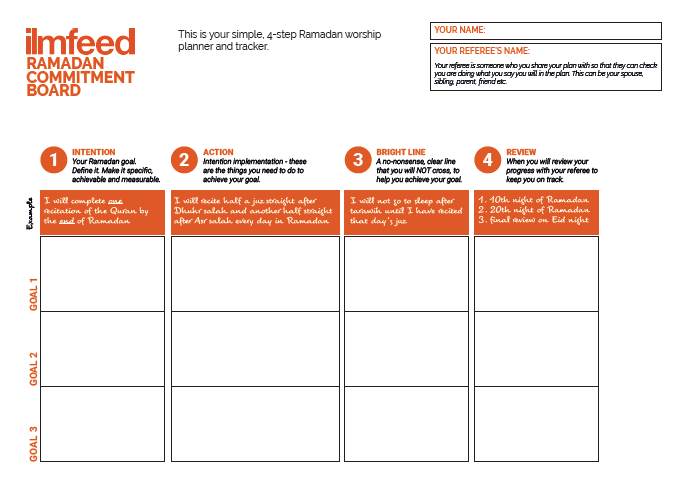One evening, after an exhausting day of work, Zaynab is leisurely browsing Instagram on her phone and she sees a Ramadan post (“100 days till Ramadan!”). Even though Ramadan is an annual event, Zaynab is caught by surprise. Somewhere, filed away in the back of her mind, she had the intention of planning her Ramadan activities in advance. But Ramadan is still a few months away so she sees no need to panic.
Some time passes and the thought of Ramadan planning swims gently back to the comfort of the ‘to do someday’ area of Zaynab’s mind. Besides, she is so busy with work and family that she cannot find the time immediately to think the plan through and the plan for Ramadan has to be thorough – a lot is riding on it. So she puts it off some more, promising herself she will allocate some serious time to it soon.
More time passes by and now the notifications are saying ‘thirty days till Ramadan!’. Ramadan aisles have sprung up in supermarkets. “I really should make a plan” she says to herself as she eyes the ‘four cans of chick peas for £1’ deal.
Now people have started sharing the ‘buy Palestinian dates’ posts and it’s only a few days left. The local Masjid has published taraweeh times. Aspiring food bloggers are taunting her with their Ramadan recipes on Facebook. Zaynab hastily makes some last-minute intentions. “I will pray as much as I can in Ramadan, I will finish two complete recitations of the Quran and I will donate money to charity”. It’s not the elaborate plan she imagined in her mind but it’s a good plan, she thinks to herself.
Ramadan begins and Zaynab is still not sure how that happened as she stands for taraweeh prayers. But she sticks to her loose plan. The Ramadan buzz is in the air, especially notable on social media, and the hype carries Zaynab through her plan and it’s going really well. Until about day four. The iftar invitations kick in, the charity events begin, the adrenaline gets depleted and fatigue sets in. Zaynab begins to notice the dip in her worship and that makes her feel bad which in turn demotivates her. She falls back to just concentrating on the five daily prayers, taraweeh prayers (mostly eight rak’ats) and the fasting itself.
At the end of Ramadan she cannot say for sure how much she increased her worship by. And in all probability, she will not have carried over any good habits into the rest of the year.
So where did it go wrong?
We can all relate to the scenario above, at least to some degree. Although I am focusing specifically on Ramadan, the behaviour that led to the dip in worship, in the scenario above with Zaynab, is very common. It’s this behaviour that prevents us from achieving our goals, whether in worship, at work or in our personal lives. For simplicity, let’s call this type of behaviour ‘bad behaviour’.
To overcome the problem of bad behaviour we must first be able to understand the underlying causes. The bad news is that most of it stems from the way we think. The good news is that we can change the way we think and in this article I intend to use the findings from research in behavioural science and my experience in campaign planning to help you think through, develop and action your Ramadan plans more effectively.
Your Ramadan plan will not be a long document. It’s just one page. And each goal has just four steps.
You can download the plan by clicking on the image below:
Why do we put off things that are good for us?
Let’s begin by looking at why Zaynab put off Ramadan planning until she ran out of time. In his award-winning book ‘Thinking, fast and slow’ Nobel Prize winner Daniel Kahneman explains that human beings have two modes of thinking. One is the fast mode which enables us to do things automatically and without using much of our concentration. And the other is the slow mode which requires much more concentration and time. If I asked you what is 100 + 150, you could immediately tell me the answer. But if I asked you what is 278 x 678, although you could probably work it out, it would require more time and concentration.
When it comes to thinking, our concentration is not unlimited. We can only use a certain amount before it gets too much for us and we end up abandoning the task or putting it off. And for many of us, the thought of using high levels of concentration over a long period of time flags up as painful in our mind and we automatically reach for any reason to delay that task. This is why we make bad decisions. This is why we are able to browse social media for hours but hesitate to read up on mortgages thoroughly, or work out the best tariff for energy use, or even write our CVs and covering letters.
This is why Zaynab kept putting off planning. It would require time and concentration to plan effectively. Add to that the fact that she might not be good at planning. Perhaps she has never made a plan for Ramadan and she imagines that it would take a lot of mental effort.
But it doesn’t have to. Ramadan planning can be a breeze if you have a template that makes the thinking easier and that is exactly what I have designed for you. Read on to understand the different stages of the plan and then use the ‘commitment board’ to easily construct your Ramadan plan.
Before you begin
While you are reading through this guide, it’s not important to write anything down. The important thing is to be able to think through each part of your plan in your mind. You already have an idea of what your Ramadan goals are, what might be missing is the ‘how to get there’ bits. This plan will help you think that through, and that process will increase your chances of success significantly.
Is it important to plan?
Yes. Planning enables us to accomplish goals much more effectively. In the holy Quran, Allah (SWT) tells us that He is the best planner. In the seerah of our beloved prophet Muhammad (peace and blessings be upon him), there are many examples of planning. As Muslims, we should be in the habit of devising and implementing plans and then holding ourselves to account. This will benefit us in this life and in the hereafter insha’Allah.
Step 1: Intention
The first stage of the plan is to think about your Ramadan goals.
Focus
Research in behavioural science has shown that having fewer goals to focus on increases the chances of success. Therefore think about the top three goals you want to achieve in Ramadan. Don’t think of Ramadan as a sprint in which you will achieve every utopian goal because you may be setting yourself up to fail. Think of Ramadan as the time in which you are going to change your behaviour and perfect three elements of your worship which you will be able to carry into the rest of the year. Insha’Allah you can focus on another three goals next Ramadan. So over the course of a few Ramadans you will change your daily behaviour to include more worship permanently insha’Allah.
Assess the current situation
Thinking about your three goals, what is the current situation. You don’t have to write this down anywhere or share it with anyone but you do have to be honest with yourself. So if one of your goals is to finish three complete recitations (khatm) of the Quran, how much do you recite in a normal week? How much time do you spend reciting the Quran?
Keep it real and stretch it.
We all want to achieve extraordinary things in Ramadan but we have to be honest. If you do not spend any time reciting the Quran during the year, it is unlikely that you will complete three recitations in thirty days. Unless you are taking time off from work and other commitments or going into itikaf. But for most of us, Ramadan is a time where we try to fit in additional worship around existing work and family commitments. So make sure that your goal reflects this. Remember, we want to change behaviour through regular activities.
The Prophet ﷺ said,
“The most beloved of deeds to Allah are those that are most consistent, even if it is small”
If you do not spend much time reciting Quran during a normal week, maybe a good goal is one complete reciting the whole Quran. That is an achievable goal. If you do already regularly recite the Quran then maybe one completion is too easy and you need to stretch your goal.
What does success look like?
How will you know you have achieved your goal? In the Quran recitation example it’s easy to know that you have achieved your goal – complete a recitation before Ramadan ends. But what if your goal is ‘pray tahajjud’, how will you know if you have achieved your goal? This is why your goal has to be very specific. ‘I will pray tahajjud every night in Ramadan’ or ‘I will pray tahajjud 5 nights a week in Ramadan’ is much more specific and you will be able to track your progress. At the end of Ramadan you have specific criteria to help you assess whether or not you have achieved your goal.
Step 2: Action
Now that you have your goals, you need to think about how you will achieve your goals. Imagine that your goal is a destination three thousand miles away and you have one month to drive there.
Which of the following methods is most likely to get you to your destination on time?
- Drive as much as you can, when you can.
- Drive 100 miles a day or 2 hours per day.
The answer of course is method two. Method two charts out your journey and makes it easy for you to stay on track.
This is an example of an ‘intention implementation’. Intention implementations are steps that you take to accomplish your goal. They make tracking and achieving your goal simpler and hassle free – accomplish your intention implementations and you will achieve your goal.
Now let’s think about the Quran recitation goal again and think about what you need to do every day to ensure that you complete the recitation in Ramadan. You may decide that you want to recite one juz a day. One juz takes about an hour to recite so you would need to look at your day and identify where you can slot in an hour’s recitation time. It doesn’t have to be one hour in one go – you can find two slots of 30 minutes each as an example. Or even 4 slots of 15 minutes each.
Turning your action into habit
Research suggests that linking a behaviour to a situation consistently over a period of time turns it into habit. So if you perform salah (situational cue) and then immediately afterwards you recite Quran (the behaviour) consistently in Ramadan, that should become a habit and you should find it easier to consistently recite Quran during the rest of the year. This is worth remembering when you are writing your intention implementation (action) statements.
Therefore your intention implementation could be ‘I will recite thirty minutes of Quran after Dhuhr and Asr salah every day in Ramadan’. This will make it easy for you to remember and action your intention implementation and at the same time work towards making it a lasting habit.
Step 3: Bright lines
A bright line refers to a clearly defined rule or standard. It is a rule with clear interpretation and very little wiggle room.
Imagine that your plan for completing a recitation of the Quran involves four slots of fifteen minute recitations throughout the day. In between that and all the other things you will do during Ramadan, on some days it may become unclear whether or not you have completed your actions. Then you have to work out where you are, especially if you fall behind a few days and you are catching up. To avoid this scenario, you can have a bright line rule as follows:
“I will NOT go to sleep after taraweeh UNTIL I have completed that day’s juz”
This is a simple check and will make sure that you don’t fall behind, as there is no room for misinterpretation.
Step 4: Review
Using the driving example in the last section, imagine you planned to drive for two hours every day and you stuck to it. But you did not, during the entire time, review your progress. At the end of thirty days you review your progress and see that you still have a few miles left to drive. But you are now out of time. It’s too late to do anything about it. This is why it’s important to review your progress regularly.
Reviewing your progress as you go along will help you stay on track and make tweaks during the thirty days. You will know if you are falling behind and will be able to do something about it. Or you may discover that there is scope to do more and you may wish to stretch your overall goal.
The review at the end of Ramadan should be straightforward if you articulated your goals effectively. That is why you need to make sure your goals are very specific.
Referee
If you have ever participated in a charity event or challenge, you may recall that at moments where you lost motivation, what kept you going was the fact that you told people about your event and people had donated towards the cause. Announcing our intentions to other people is a powerful way to increase our chances of following through on our intentions. Some social scientists have even made a link between the number of witnesses at a wedding and the desire to follow through on the commitment by the couple. We can use this technique in our Ramadan plan by appointing a commitment board referee.
Your commitment board referee should be someone who you will share your plan with so that they can ask you if you are doing what you said you will in your plan. Think carefully about who this should be. You don’t want to appoint someone who will be too harsh on you or too lenient, and it must be someone whose approval you value.
For example, if your referee is your wife who sees you struggle through the day and then encourages you to ‘just go to sleep darling’ then you need someone a bit firmer. But equally you don’t want someone who will call you a failure while witnessing you at the point of breaking.
About the author: Arman Ali is a strategic communications and marketing professional with over a decade’s experience in education, third sectoIlmFeed Ramadan Commitment Boardr and government communications. Arman is an associate member of the Chartered Institute of Marketing and a member of the Chartered Institute of Public Relations.



